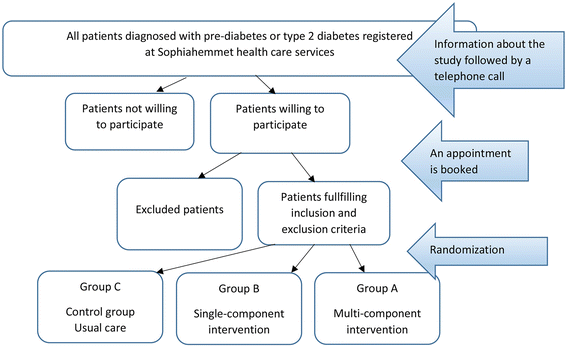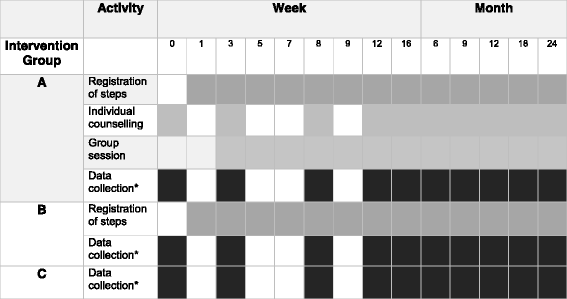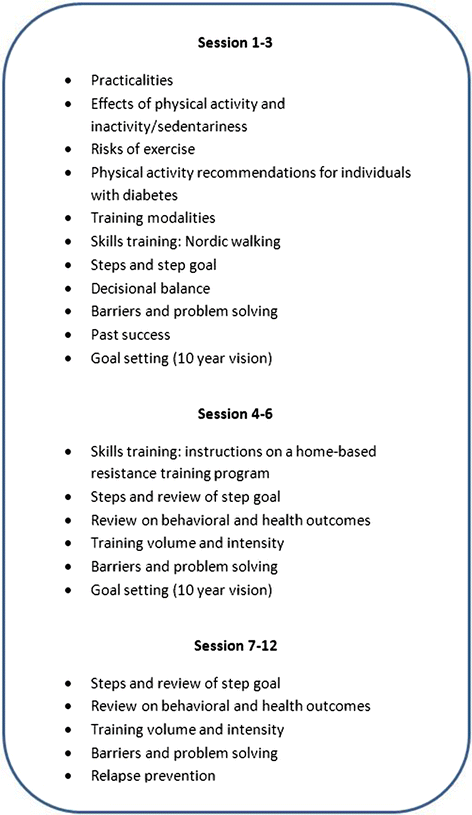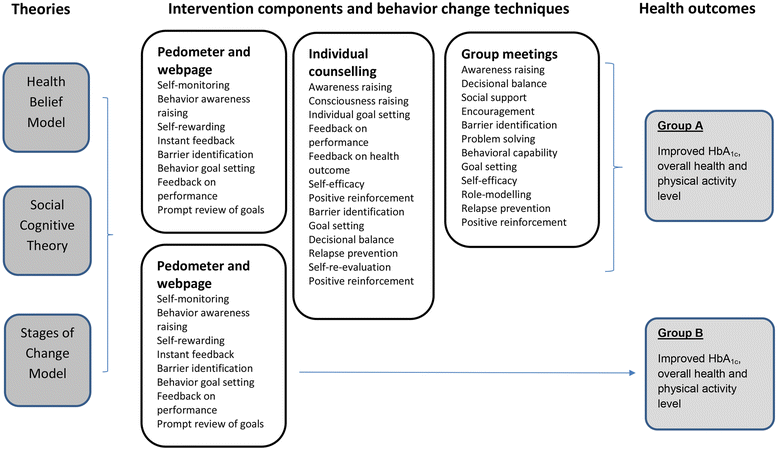Physical activity promotion in the primary care setting in pre- and type 2 diabetes - the Sophia step study, an RCT
- PMID: 26164092
- PMCID: PMC4499440
- DOI: 10.1186/s12889-015-1941-9
Physical activity promotion in the primary care setting in pre- and type 2 diabetes - the Sophia step study, an RCT
Abstract
Background: Physical activity prevents or delays progression of impaired glucose tolerance in high-risk individuals. Physical activity promotion should serve as a basis in diabetes care. It is necessary to develop and evaluate health-promoting methods that are feasible as well as cost-effective within diabetes care. The aim of Sophia Step Study is to evaluate the impact of a multi-component and a single component physical activity intervention aiming at improving HbA1c (primary outcome) and other metabolic and cardiovascular risk factors, physical activity levels and overall health in patients with pre- and type 2 diabetes.
Methods/design: Sophia Step Study is a randomized controlled trial and participants are randomly assigned to either a multi-component intervention group (A), a pedometer group (B) or a control group (C). In total, 310 patients will be included and followed for 24 months. Group A participants are offered pedometers and a website to register steps, physical activity on prescription with yearly follow-ups, motivational interviewing (10 occasions) and group consultations (including walks, 12 occasions). Group B participants are offered pedometers and a website to register steps. Group C are offered usual care. The theoretical framework underpinning the interventions is the Health Belief Model, the Stages of Change Model, and the Social Cognitive Theory. Both the multi-component intervention (group A) and the pedometer intervention (group B) are using several techniques for behavior change such as self-monitoring, goal setting, feedback and relapse prevention. Measurements are made at week 0, 8, 12, 16, month 6, 9, 12, 18 and 24, including metabolic and cardiovascular biomarkers (HbA1c as primary health outcome), accelerometry and daily steps. Furthermore, questionnaires were used to evaluate dietary intake, physical activity, perceived ability to perform physical activity, perceived support for being active, quality of life, anxiety, depression, well-being, perceived treatment, perceived stress and diabetes self- efficacy.
Discussion: This study will show if a multi-component intervention using pedometers with group- and individual consultations is more effective than a single- component intervention using pedometers alone, in increasing physical activity and improving HbA1c, other metabolic and cardiovascular risk factors, physical activity levels and overall health in patients with pre- and type 2 diabetes.
Trial registration: ClinicalTrials.gov Identifier: NCT02374788 . Registered 28 January 2015.
Figures




References
-
- Authors/Task Force M. Ryden L, Grant PJ, Anker SD, Berne C, Cosentino F, Danchin N, Deaton C, Escaned J, Hammes HP, et al. ESC Guidelines on diabetes, pre-diabetes, and cardiovascular diseases developed in collaboration with the EASD: the Task Force on diabetes, pre-diabetes, and cardiovascular diseases of the European Society of Cardiology (ESC) and developed in collaboration with the European Association for the Study of Diabetes (EASD) Eur Heart J. 2013;34(39):3035–3087. doi: 10.1093/eurheartj/eht108. - DOI - PubMed
-
- Colberg SR, Albright AL, Blissmer BJ, Braun B, Chasan-Taber L, Fernhall B, Regensteiner JG, Rubin RR, Sigal RJ, American College of Sports M et al. Exercise and type 2 diabetes: American College of Sports Medicine and the American Diabetes Association: joint position statement. Exercise and type 2 diabetes. Med Sci Sports Exerc. 2010;42(12):2282–2303. doi: 10.1249/MSS.0b013e3181eeb61c. - DOI - PubMed
-
- Sluik D, Buijsse B, Muckelbauer R, Kaaks R, Teucher B, Johnsen NF, Tjonneland A, Overvad K, Ostergaard JN, Amiano P, et al. Physical Activity and Mortality in Individuals With Diabetes Mellitus: A Prospective Study and Meta-analysis. Arch Intern Med. 2012;172(17):1285–1295. doi: 10.1001/archinternmed.2012.3130. - DOI - PubMed
Publication types
MeSH terms
Associated data
LinkOut - more resources
Full Text Sources
Other Literature Sources
Medical

